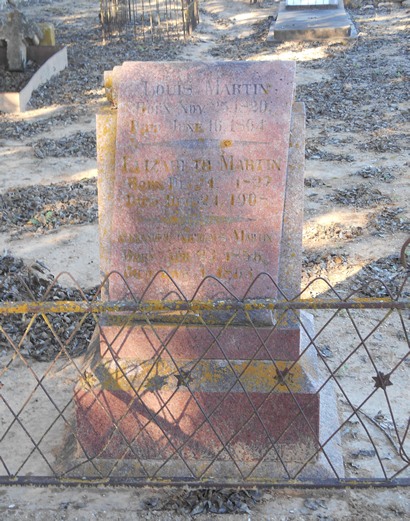|
Texas
| Columns
Looking back
at
The Martin House
on Hedwig's Hill
|
|
Louis
Martin, born in Erndtebrueck, Prussia, arrived in Meusebach's
Texas colony on Baron's Creek in 1844. He married Elizabeth Arhelger
in 1847. Then in 1853, in search of elbow room, Martin relocated to
a remote frontier settlement north of the Llano
River.
Two years later he bought a house along the river and the hill next
to it in what would soon become Mason
County. Martin named his new home Hedwig's
Hill after his mother and daughter. The house was headquarters
for his farming, ranching and freight-hauling business.
The house, made of oak logs with a limestone fireplace at each end,
was probably built by John Kline in 1853, and its now familiar design
was an evolutionary step in frontier architecture. It was really two
log cabins under a common roof with a breezeway between. Every wall
was an outside wall - a great improvement in natural ventilation. |
Martin House
(now at the Ranching Heritage Center in Lubbock)
Photo by Billy Hathorn, Wikimedia Commons |
|
But a quiet
life at his log house on the lonely Texas frontier was not in the
cards for Louis Martin. He held dangerous and unpopular opinions.
Like most Germans, he was no friend of the southern confederacy,
and his outspoken criticism of slavery rubbed bad-tempered secessionist
neighbors the wrong way.
During the Civil War he angered confederates even more by doing
business in a manner that circumvented rebel authority. He freighted
cotton and other products to Piedras Negras, Mexico, sold his produce
to foreign agents for gold and returned to Hedwig's
Hill with smuggled goods unavailable through blockaded confederate
ports.
In June 1864 Martin and his nephew, Eugene Frantzen, started for
the Rio Grande with a wagonload of salt pork and cured bacon. With
a little luck they hoped to make the 200 mile trip to Piedras Negras
in two weeks.
They arrived in Uvalde right on schedule, but then their luck ran
out. On June 14, 1864, bandits following from Mason
County waylaid the Germans at the Nueces River crossing south
of town. The outlaws hung Martin and Frantzen and stole a sack of
gold hidden in a side of bacon.
A week later a group of tattered men stopped at the Martin house
at Hedwig's Hill. It was no social
call. The men forced Elizabeth Martin to cook their supper; then
before they rode away they proudly confessed to her that they murdered
her husband and his nephew and took the gold.
Although Elizabeth recognized faces in the crowd, she never reported
the incident to the authorities. She was afraid the desperadoes
would harm her children.
Then in December Elizabeth drove a buckboard to South Texas and
brought the bodies of her husband and his nephew home for burial.
On the return trip she stopped in Fredericksburg
for funeral supplies. Her journal reads, "Two coffins: two dollars
and fifty cents."
She buried the men in a common grave in Der Stadt Friedhof (the
City Cemetery) in Fredericksburg.
|
 |
Elizabeth Martin
went back to Mason County,
but her troubles were not over. Bandits rustled her cattle and suspicious
fires destroyed a couple of buildings on her property. Life was never
easy at the Martin house on Hedwig's Hill.
In 1867 outlaws attacked the Martin house and killed two of Mrs. Martin's
employees. The army dispatched troops from Fort
Mason to arrest the attackers, but the trail went cold.
Elizabeth Martin was rawhide tough, but she could only take so much.
In 1870, with her endurance stretched to the limit, she sold out and
moved to Fredericksburg.
Meanwhile the old Kline/Martin house stood firm through it all. It
was the prototype for many similar cabins all along the western frontier.
It was not the first dogtrot house - a design with roots in Appalachia,
but it was one of the earliest of its kind in West Texas.
The historic old house watched over the comings and goings at Hedwig's
Hill until 1974 when the owners donated it to Texas Tech University.
Today it is on display at the Ranching Heritage Center in Lubbock. |
© Michael
Barr
"Hindsights"
January
1, 2017 Column
Sources:
Fredericksburg Standard, December 1, 1976, "Gillespie Bicentennial
Minutes," Section 2, p20.
Mason County News, December 20, 1979, "Mason County's Unsettled Years,
1860-1880," sec.2, p4.
Globe Arizona Silver Belt, January 5, 1909, "Was Known All Through
Texas," c6, p8.
See
also
Texas
Small Town Sagas
Texas
History
Texas
Hill Country
|
|
| Books by Michael
Barr - Order Here: |
|

 Gulf
Coast
Gulf
Coast East
Texas
East
Texas Central
North
Central
North Central
South
Central
South Panhandle
Panhandle South
Texas
South
Texas Hill
Country
Hill
Country West
Texas
West
Texas Ghost
Towns
Ghost
Towns COUNTIES
COUNTIES